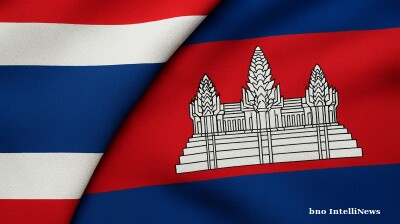Analysts concluded that Slovaks had better grasped the threat of extremism as the results from the weekend regional elections brought about a decisive defeat for neo-fascist and anti-European Union candidate Marian Kotleba, governor of the Banska Bystrica region.
Prime Minister Robert Fico, meanwhile, was also digesting a reverse after four members of his leftist Smer-Social Democracy Party were also defeated, meaning his party, which has governed Slovakia for five years, will now only lead two of eight regional governments, with candidates backed by opposition parties leading five.
Following his victory over Kotleba, the independent and businessman Jan Lunter, told reporters: “The first thing I’ll do in the governor’s office will be to open all the doors and windows and let in some fresh air. And as I think it’s important that we go back to the European Union again, we will put up its flag in the office again, back where it belongs.”
“We belong in Europe, we don’t want to leave,” Lunter, whose candidacy was supported by the governing coalition and opposition, added. He took 48.53% of the vote compared to Kotleba’s 23.24%.
President Andrej Kiska, also an independent, declared after casting his ballot that it was time for voters to decide “which direction our country is going to take, for the extremists, the neo-fascists, to not take their place”.
“We’ve woken up to a good morning,” Grigorij Meseznikov, a political analyst and president of non-governmental think tank Institute for Public Affairs told news website Topky.sk.
Kotleba was elected governor of Banska Bystrica, in central Slovakia, in 2013. He became a member of Slovakia’s parliament three years later, as did 13 other members of his party, Kotleba: People’s Party Our Slovakia (LSNS). The regional elections also saw the party win just two of more than 400 seats.
Pro-EU boost on eve of bloc presidency
The election results come as a boost to those determined to make the most of Slovakia’s imminent taking up of the rotating presidency of the EU. PM Fico on October 23 talked of Slovakia as a now “pro-European island” in Central Europe, two days after general election voters in neighbouring Czechia overwhelmingly backed billionaire eurosceptic and Slovak-born Andrej Babis’s Ano party, a result which has raised serious questions over the likely eastwards or westwards orientation of that country.
Fico has a mixed record on relations with the EU, having clashed with EU officials several times. However, he led Slovakia into the eurozone—it is the only one of the Visegrad Four states to be a member—and while Slovakia’s neighbours have increasingly questioned the bloc’s role of late, he has become an increasingly vocal enthusiast.
Nevertheless, looking at the regional election results, Fico’s Smer will have to ponder whether voters are tiring of the party. The contest was the first major test of political mood in Slovakia since the March 2016 general election, at which coalition-leading Smer party lost its majority amid a bitter anti-immigration campaign that pushed voters to the right. LSNS entered parliament with around 8% of the vote.
Smer found itself on the retreat as most candidates successfully campaigned with anticorruption platforms, pledging to deliver change compared to the old political leadership. Slovaks have been disturbed by numerous unresolved corruption scandals of the past few years. There have lately been student-led anti-corruption demonstrations in Bratislava and other cities.
Voter turnout on Saturday was estimated at 30 percent, up 10 points from previous regional elections. The results came as a surprise for many: A new law barred the publication of opinion polls in the two weeks before Election Day.
In July, Slovak police charged Kotleba with extremism, while in May the prosecutor’s office launched a bid to ban LSNS. Kotleba, who has often dressed in a uniform modelled on the Hlinka Guard, the militia of the 1939-45 Nazi-sponsored Slovak State, regularly rages against the Roma minority in the country.
The elections in the Bratislava region were won by the candidate of the opposition right-wing coalition (SaS, OLaNO, SMK-MKP, NOVA, OKS, Zmena Zdola, DU), Juraj Droba, with 20.4% of the votes.
Jozef Viskupic backed by OLaNO, SaS, KDH, OKS, Zmena Zdola, DU won the race for Trnava governor with 42.9% of votes.
In Trencin region, the governor’s post was won by the candidate supported by the ruling coalition, Jaroslav Baska, with 49.9% backing. The candidate of the ruling coalition also won the election in Nitra, with 34.1% of the votes.
Erika Jurinova (supported by OLaNO, SaS, KDH, OKS, NOVA) has become Slovakia's first-ever female regional governor, winning the elections in Zilina region with 43.7% of the votes. In Kosice region, the elections were won by Rastislav Trnka (backed by KDH, SaS, OLaNO, NOVA, Sanca) while the governor post in Presov region was won by Milan Majersky (SaS, KDH, OLaNO, NOVA).
News

Cambodia and Thailand agree peace deal
Thailand and Cambodia have agreed a peace deal to mark the end of a conflict earlier in the year as Cambodian Prime Minister Hun Manet and Thai Prime Minister Anutin Charnvirakul attended a signing ceremony overseen by US President Donald Trump.

Trump would like to meet North Korea’s Kim Jong Un during Asia trip
The prospect of renewed diplomacy between Washington and Pyongyang has lingered since Kim’s remarks last month suggesting a willingness to speak to the outside world.

Bill Gates makes surprise Indian TV debut
In a move set to spark both intrigue and curiosity, Microsoft co-founder and philanthropist Bill Gates has made a cameo appearance on Indian television, entering the iconic drama series Kyunki Saas Bhi Kabhi Bahu Thi 2.

Queen Sirikit of Thailand dies
The death of Queen Sirikit of Thailand has marked the end of an era for the Thai monarchy. According to an official statement from the Bureau of the Royal Household of Thailand, Her Majesty died at 9.21 pm on October 24.




